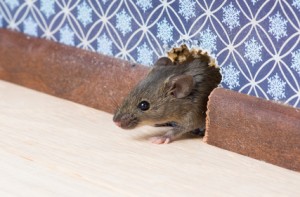

Mice are cute. They have little faces that just exude adorableness, not to mention a whole company was built around one. There isn’t anyone who hasn’t heard of Mickey Mouse. They even make a fun, low maintenance pet. However, when mice enter your home and start gnawing on drywall and eating your food, it becomes one of the most annoying pests. Mice can gnaw on electrical wire and cause fire hazards. And the feces left behind can cause health hazards to you and your family.
You may now even know that you have a mouse problem until it gets out of hand. Mice are tiny, about 2 to 3 inches long with a tail that’s about 3 inches. They are nocturnal animals that like to stay in the shadows and in cupboards. A mouse is extremely flexible and can fit through the tiniest crack or hole, even those as little as ¼ inch. These little speed demons are a complete blur as the zip by you at 12 feet per second, so you might only see a quick movement and wonder “What was that?”. You may notice small black pellets in your cupboards, this is mouse droppings or feces. And of course, another telltale sign of a mouse is boxes or bags of food that have been gnawed into. Did you know that mice do not need a water supply? They can live on the water that is in the food that it eats. Another way mice are detected is to hear it skittering around in your ceiling or in the walls.
Diseases that mice spread can be by direct contact; feces, urine or bites. Did you know that the house mouse has no bladder control? The literally pee while they walk. Or by indirect contact like the fleas or mites they carry. Some of the diseases that are transmitted or carried by the house mouse are leptospirosis, tapeworms, salmonellosis and rickettsia pox.
There are various ways to control the mouse population that invade your home. You can purchase traps. There is the convention spring mouse trap, the glue mouse trap and even humane traps that you can use to catch and release the mice. There are poisons you can leave for the mice to eat. You can get a cat to prey on the mice. Or you can call in an exterminator to spray for them.
Now that you know so much more about the house mouse, it should be easier for you to identify them, know if you have a problem and how to fix it.
